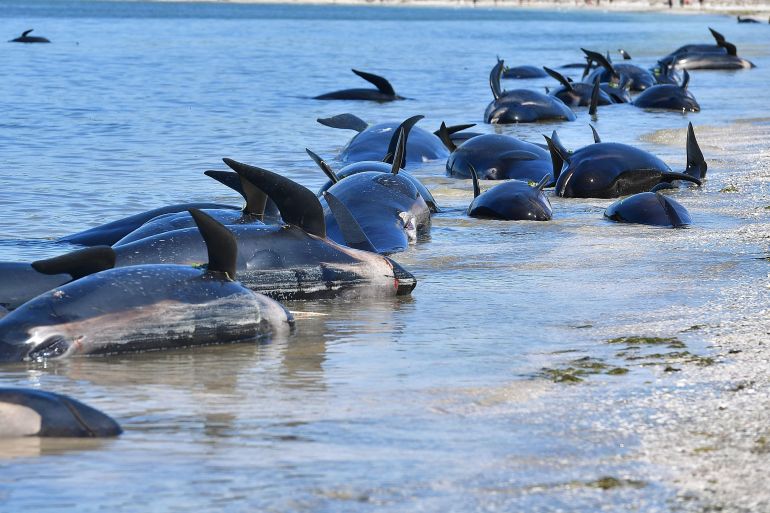Dozens of whales die in New Zealand stranding
Marine mammals die at Farewell Spit on the South Island, the site of at least 10 strandings in 15 years.

More than two dozen whales died in a mass stranding at a New Zealand beach, wildlife rangers have said.
The Department of Conservation said 29 long-finned pilot whales were already dead when the pod of 34 marine mammals was found at remote Farewell Spit on the South Island late on Thursday.
Keep reading
list of 4 itemsNew Zealand mass stranding leaves nearly 100 whales dead
Dozens of pilot whales die in latest New Zealand stranding
Hundreds of whales refloat after New Zealand strandings
The department said it was attempting to refloat the remaining five whales with the morning’s high tide.
“The process can take some time and we may not know if it is successful or not for several hours,” it said on its Facebook page.
Spokesman Dave Winterburn said rangers were providing care for the animals but noted “the whales have now been out of the water for some time”.
“While this event is unfortunate, whale strandings are a natural phenomenon,” he told the AFP news agency.
Project Jonah, a local whale rescue group, said that its medics were at Farewell Spit with the Department of Conservation.
“This is a stressful time for the whales after their time spent stranded yesterday and this morning, so close monitoring of their condition and responses in the water is key,” the group wrote on Twitter.
Farewell Spit, is a 26 kilometre (16 mile) sliver of sand that extends into the Tasman Sea and creates intertidal sand flats that can extend across many kilometres.
It has seen more than 10 pilot whale strandings in the past 15 years.
The largest was in February 2017, when nearly 700 of the mammals beached, and 250 died.
STRANDING UPDATE@docgovtnz rangers and PJ medics are working to refloat the 5 surviving pilot whales. This is a stressful time for the whales after their time spent stranded yesterday and this morning, so close monitoring of their condition and responses in the water is key. pic.twitter.com/8PHPuMTaXR
— Project Jonah (@ProjectJonah) March 17, 2022
Scientists are unclear on why the beach is so deadly. One theory is that the spit creates a shallow seabed in the bay that interferes with the whales’ sonar navigation systems.
Pilot whales, which can grow to as many as six metres (20 feet) long, are the most common species of whale found in New Zealand waters.